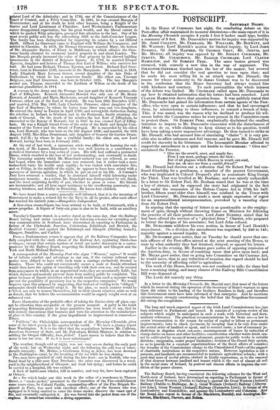POSTSCRIPT.
SATURDAY NIGHT.
In the House of Commons last night, the concluding debate on the Post-office affair maintained its monster dimensions—the main report of it in the Morning Chronicle occupies 9 yards 1 foot 8 inches small type, besides a summary of 3 feet. Mr. Duncombe's motion for inquiry was supported by Mr. JOHN CoLLETT, Mr. FERRARI), Mr. Wmasits, Mr. BLEWITT, and Mr. WATSON; Lord Howick's motion for limited inquiry, by Lord JOAN RUSSELL, Sir JOHN HANKER, Sir GEORGE GREY, MT. JERVIS, and Mr. Moraz all inquiry was opposed by Mr. RIDLEY COLBOILIW, STRUTT, dr. COLQUHOUN, Mr. &LILLIE COCHRANE, Lord CLAUDE HAMILTON, and Sir HOIIEST PEEL. The same beaten ground was retraced, with scarcely a new idea in the way of argument. The SOLICITOR-GENERAL touched upon the law of the matter, but avowed that he did not consider the real question to turn upon that; and he made his most telling hit in an attack upon Mr. Disraeli; the reason for whose animosity to Sir. James Graham was to be discovered in the confession that the Home Secretary had always treated him with kindness and courtesy. To such personalities the whole interest of the debate was limited. Mr. Coca:BANE called upon Mr. Ihinconahe, to say how he obtained information that his letters had been searched. Lord CLAUDE HAMILTON drove that question home. It was publicly stated that Mr. Duncombe had gained his information from certain agents of the Post- office, who were open to certain influences: and that he had encouraged them, by administering to those influences, to commit a breach of duty. This, it was stated, was the reason why he declined to produce his wit- nesses before the Committee unless he were present in the Committee-room to protect them. Sir ROBERT PEEL emphatically disclaimed the smallest intention to impute to Mr. Duncombe connexion with the disturbances of 1842: to do so, while claiming to keep silence as to his question, would have been taking a most ungenerous advantage. He then turned to strike at Mr. Disraeli, who had accused him of simulating " choler ": it is very pos- sible also to affect calmness and feel rancour, and be gave Mr. Disraeli full credit for sincerity in his bitterness. The honourable Member affected to supportthe amendment in a spirit not hostile to Government: "Give me," exclaimed the Premier,
"Give me the avow!d, meet, and-manly-foe; Firm I can meet, perhaps return the blow: But of all plagues which Heaven in wrath can send, Save me oh save me from a candid friend!"
Mr. Disraeli had thrown out a reflection that Sir Robert Peel had con- fessed friendship for a gentleman, a member of the present Government, who was implicated in Colonel Despard's plot to assassinate King George the Third. That was levelled at Mr. Bonham; and was ntterly unfounded. In a letter to Sir Robert Peel, Mr. Bonham stated that he was at the time ahoy of sixteen; and he supposed the story had Originated in the fact that, under the suspension of the Habeas Corpus Act in 1799, his half- brother, fifteen years older than himself, was confined in the Tower with Lord Cloncurry. Mr. Dian ARTA made a most ample expression of regret for an unpremeditated misrepresentation, provoked by a taunting cheer from Sir Robert Peel.
In arguing that the opening of letters is as questionable as the employ- ment of spies, though without throwing blame on Ministers for following the practice of all their predecessors, Lord Joart RUSSELL stated that he had been offered the services of a "physical force" Chartist, who propoised to betray the designs of his associates; but Lord John refused.
Mr. Duwcoaran withdrew his own motion, in favour of Lord Howiok's amendment. On a division, the amendment was negatived, by 240 to 145; majority against a second inquiry, 95.
Mr. DUNCOMBE gave notice, that on Tuesday he should move that cer- tain officers of the Post-office attend at the next meeting of the House, to state by what authority they had detained, delayed, or opened his letters.
Earlier in the evening, Mr. BARNES gave notice of opposing remission of the Auction-duty, in favour of remitting taxes that press upon land; and Mr. Damns gave notice, that on going into Committee on the Customs Act, he would move, that in any reduction of taxation due regard should be had to the necessity of affording relief to agriculture.
The work of the House, however, was not confined to talk; for there had been a morning sitting, and many clauses of the Railway Bills Consolidation Bill were disposed of.
The Lords did scarcely any thing.


























 Previous page
Previous page